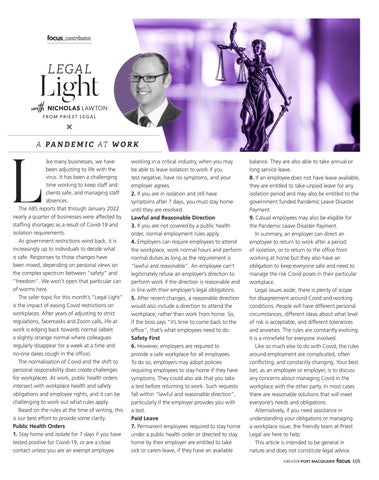focus_contributor.
LEGAL
Light
with NICHOLAS LAWTON FROM PRIEST LEGAL
A PA N D E M I C AT W O R K
L
ike many businesses, we have been adjusting to life with the virus. It has been a challenging time working to keep staff and clients safe, and managing staff absences. The ABS reports that through January 2022 nearly a quarter of businesses were affected by staffing shortages as a result of Covid-19 and isolation requirements. As government restrictions wind back, it is increasingly up to individuals to decide what is safe. Responses to those changes have been mixed, depending on personal views on the complex spectrum between “safety” and “freedom”. We won’t open that particular can of worms here. The safer topic for this month’s “Legal Light” is the impact of easing Covid restrictions on workplaces. After years of adjusting to strict regulations, facemasks and Zoom calls, life at work is edging back towards normal (albeit a slightly strange normal where colleagues regularly disappear for a week at a time and no-one dares cough in the office). The normalisation of Covid and the shift to personal responsibility does create challenges for workplaces. At work, public health orders intersect with workplace health and safety obligations and employee rights, and it can be challenging to work out what rules apply. Based on the rules at the time of writing, this is our best effort to provide some clarity: Public Health Orders 1. Stay home and isolate for 7 days if you have tested positive for Covid-19, or are a close contact unless you are an exempt employee
working in a critical industry, when you may be able to leave isolation to work if you test negative, have no symptoms, and your employer agrees. 2. If you are in isolation and still have symptoms after 7 days, you must stay home until they are resolved. Lawful and Reasonable Direction 3. If you are not covered by a public health order, normal employment rules apply. 4. Employers can require employees to attend the workplace, work normal hours and perform normal duties as long as the requirement is “lawful and reasonable”. An employee can’t legitimately refuse an employer’s direction to perform work if the direction is reasonable and in line with their employer’s legal obligations. 5. After recent changes, a reasonable direction would also include a direction to attend the workplace, rather than work from home. So, if the boss says “it’s time to come back to the office”, that’s what employees need to do. Safety First 6. However, employers are required to provide a safe workplace for all employees. To do so, employers may adopt policies requiring employees to stay home if they have symptoms. They could also ask that you take a test before returning to work. Such requests fall within “lawful and reasonable direction”, particularly if the employer provides you with a test. Paid Leave 7. Permanent employees required to stay home under a public health order or directed to stay home by their employer are entitled to take sick or carers leave, if they have an available
balance. They are also able to take annual or long service leave. 8. If an employee does not have leave available, they are entitled to take unpaid leave for any isolation period and may also be entitled to the government funded Pandemic Leave Disaster Payment. 9. Casual employees may also be eligible for the Pandemic Leave Disaster Payment. In summary, an employer can direct an employee to return to work after a period of isolation, or to return to the office from working at home but they also have an obligation to keep everyone safe and need to manage the risk Covid poses in their particular workplace. Legal issues aside, there is plenty of scope for disagreement around Covid and working conditions. People will have different personal circumstances, different ideas about what level of risk is acceptable, and different tolerances and anxieties. The rules are constantly evolving. It is a minefield for everyone involved. Like so much else to do with Covid, the rules around employment are complicated, often conflicting, and constantly changing. Your best bet, as an employee or employer, is to discuss any concerns about managing Covid in the workplace with the other party. In most cases there are reasonable solutions that will meet everyone’s needs and obligations. Alternatively, if you need assistance in understanding your obligations or managing a workplace issue, the friendly team at Priest Legal are here to help. This article is intended to be general in nature and does not constitute legal advice. GREATER PORT MACQUARIE
focus
105






